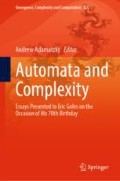Abstract
We introduce and explore some methods based on algorithmic complexity and algorithmic probability that help address the challenge of empirical causal model discovery and inverse problems. These methods, based on Algorithmic Information Dynamics (AID), are designed to describe a possible pathway from observation to causal reconstruction of the dynamics and space-time evolution of discrete systems, with consideration given to inference cost. We apply these methods to two of the most popular discrete dynamical systems, cellular automata and Boolean networks. We show that an algorithmic-probability-guided simulation of dynamic properties of these discrete systems can connect back to fundamental questions of causality and scientific discovery, whereas complexity science has traditionally tended to obfuscate such connections or obviate them with informal concepts of emergence and self-organisation. In the inverse problem of phase-space reconstruction, we consider the cost trade-off between observation and simulation in the challenge of model inference. We combine both algorithmic complexity and Bayesian methods to characterise an observation as a sequence of small computable models allowing incremental scientific model discovery, thereby providing a complexity framework that contributes to the study of causation.
Access this chapter
Tax calculation will be finalised at checkout
Purchases are for personal use only
References
Dawkins B (1991) Siobhan’s problem: the coupon collector revisited. Am Stat 45(1):76–82
Delahaye J-P, Zenil H (2012) Numerical evaluation of algorithmic complexity for short strings: a glance into the innermost structure of randomness. Appl Math Comput 219:63–77
Hernández-Orozco S, Zenil H, Riedel J, Uccello A, Kiani NA, Tegnér J (2020) Algorithmic probability-guided machine learning on non-differentiable spaces. Front Artif Intell
Kauffman S (1969) Homeostasis and differentiation in random genetic control networks. Nature 224(5215):177–178
Radó T (1962) On non-computable functions. Bell Syst Tech J 41(3):877–884
Riedel J, Zenil H (2018) Rule primality, minimal generating sets and turing-universality in the causal decomposition of elementary cellular automata. J Cell Autom 13:479–497
Soler-Toscano F, Zenil H, Delahaye J-P, Gauvrit N (2014) Calculating Kolmogorov complexity from the output frequency distributions of small turing machines. PLoS ONE 9(5):e96223
Wolfram S (1983) Statistical mechanics of cellular automata. Rev Mod Phys 55(3):601–644
Wolfram S (2002) A new kind of science, Wolfram research. IL, Champaign
Zenil H, Riedel J (2016) Asymptotic intrinsic universality and reprogrammability by behavioural emulation. In: Adamatzky A (ed) Advances in unconventional computation. Springer, pp 205–220
Zenil H, Hernàndez-Orozco S, Kiani NA, Soler-Toscano F, Rueda-Toicen A (2018) A decomposition method for global evaluation of shannon entropy and local estimations of algorithmic complexity. Entropy 20(8):605
Zenil H, Kiani NA, Zea A, Tegnér J (2019) Causal deconvolution by algorithmic generative models. Nat Mach Intell 1:58–66
Zenil H, Kiani NA, Marabita F, Deng Y, Elias S, Schmidt A, Ball G, Tegnér J (2019) An algorithmic information calculus for causal discovery and reprogramming systems. iScience S2589-0042(19):30270-6
Zenil H, Kiani NA, Abrahao FS, Tegnér J (2020) Algorithmic information dynamics. Scholarpedia 15(7):53143
Author information
Authors and Affiliations
Corresponding author
Editor information
Editors and Affiliations
Rights and permissions
Copyright information
© 2022 The Author(s), under exclusive license to Springer Nature Switzerland AG
About this chapter
Cite this chapter
Zenil, H., Zhang, Y., Kiani, N.A. (2022). Model Discovery and Discrete Inverse Problems with Cellular Automata and Boolean Networks. In: Adamatzky, A. (eds) Automata and Complexity. Emergence, Complexity and Computation, vol 42. Springer, Cham. https://doi.org/10.1007/978-3-030-92551-2_24
Download citation
DOI: https://doi.org/10.1007/978-3-030-92551-2_24
Published:
Publisher Name: Springer, Cham
Print ISBN: 978-3-030-92550-5
Online ISBN: 978-3-030-92551-2
eBook Packages: EngineeringEngineering (R0)

